Meats
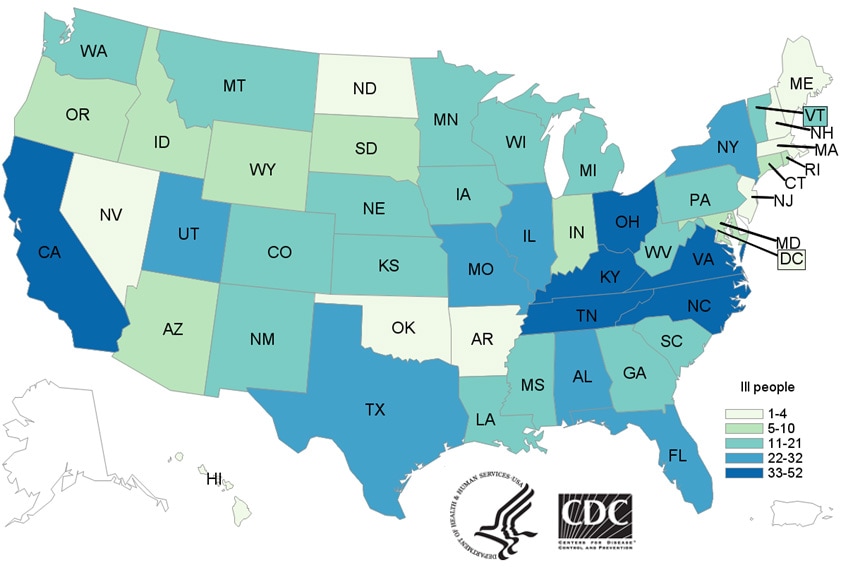 /salmonella/live-poultry-06-17/images/big-map-7-7-17.jpg
/salmonella/live-poultry-06-17/images/big-map-7-7-17.jpg
- Since the last update on June 1, 2017, 418 more ill people have been reported. The most recent illness began on June 20, 2017.
- CDC, multiple states, and the U.S. Department of Agriculture’s Animal and Plant Health Inspection Service (USDA-APHIS) are investigating 10 separate multistate outbreaks of Salmonella infections in people who had contact with live poultry in backyard flocks.
- These outbreaks are caused by several DNA fingerprints of different Salmonella bacteria: Salmonella Braenderup, Salmonella Enteritidis, Salmonella Hadar, Salmonella I 4,[5],12:i-, Salmonella Indiana, Salmonella Infantis, Salmonella Litchfield, Salmonella Mbandaka, Salmonella Muenchen, Salmonella Typhimurium.
- The outbreak strains of Salmonella have infected a reported 790 people in 48 states and the District of Columbia.
- Illnesses started on dates ranging from January 4, 2017 to June 20, 2017.
- 174 ill people have been hospitalized. No deaths have been reported.
- Epidemiologic, traceback, and laboratory findings link the 10 outbreaks to contact with live poultry, such as chicks and ducklings, from multiple hatcheries.
- In interviews, 409 (74%) of 553 ill people reported contact with live poultry in the week before illness started.
- Contact with live poultry or their environment can make people sick with Salmonella infections. Live poultry can be carrying Salmonella bacteria but appear healthy and clean, with no sign of illness.
Posted in Government Food Alerts, Poultry | No Comments »
COMBINE PASTA AND BROTH in a small pot, cover, place over medium-high heat, bring to a boil and cook 5 minutes, or until barely soft. Remove from heat and transfer contents of the pot to a work bowl. Add salt and pepper. Meanwhile, heat the olive oil over medium heat in a medium skillet on […]
Posted in Entrees / Main Dishes, Pasta, Poultry | No Comments »
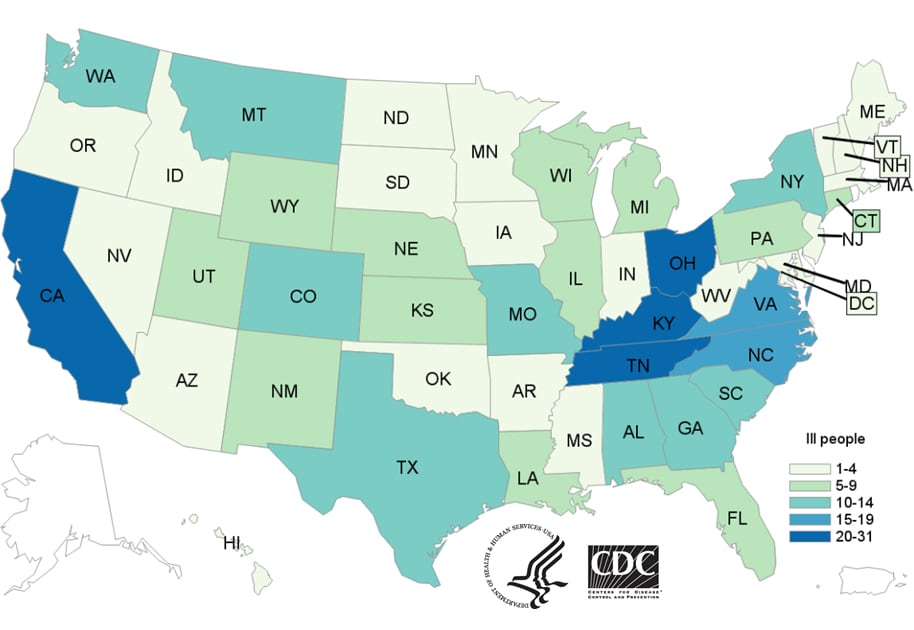
- CDC, many state departments of health and agriculture, and the U.S. Department of Agriculture’s Animal and Plant Health Inspection Service are investigating eight multistate outbreaks of human Salmonella infections linked to contact with live poultry in backyard flocks.
- These outbreaks are caused by several kinds of Salmonella bacteria: Salmonella Braenderup, Salmonella Enteritidis, Salmonella Hadar, Salmonella I 4,[5],12:i-, Salmonella Indiana, Salmonella Infantis, Salmonella Mbandaka, and Salmonella Typhimurium.
- As of May 25, 2017, 372 people infected with the outbreak strains of Salmonella have been reported from 47 states.
- Illnesses started on dates ranging from January 4, 2017 to May 13, 2017.
- 71 ill people have been hospitalized, and no deaths have been reported.
- 36% of ill people are children younger than 5 years.
- Epidemiologic, traceback, and laboratory findings link the eight outbreaks to contact with live poultry, such as chicks and ducklings, which come from several hatcheries.
- In interviews, 190 (83%) of 228 ill people reported contact with live poultry in the week before illness started.
- People reported purchasing live baby poultry from several sources, including feed supply stores, websites, hatcheries, and from relatives.
- Contact with live poultry and the areas where they live and roam can make people sick with Salmonella infections. Chicks, ducklings, and other live poultry that look healthy and clean can still carry Salmonella bacteria.
- Outbreaks linked to contact with live poultry have increased in recent years as more people keep backyard flocks. In 2016, a record number of illnesses were linked to contact with backyard poultry.
Posted in Government Food Alerts, Poultry | No Comments »
Latest Case Count Map
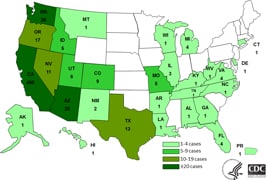
- A total of 634 persons infected with seven outbreak strains of Salmonella Heidelberg were reported from 29 states and Puerto Rico from March 1, 2013 to July 11, 2014.
- 38% of ill persons were hospitalized, and no deaths were reported.
- Most ill persons (77%) were reported from California.
- The current outbreak appears to be over as the number of reported infections has returned to the expected number for this time of year.
- Epidemiologic, laboratory, and traceback investigations conducted by local, state, and federal officials indicated that consumption of Foster Farms brand chicken was the source of this outbreak of Salmonella Heidelberg infections.
- The U.S. Department of Agriculture’s Food Safety and Inspection Service (USDA-FSIS) has determined that measures under taken by the firm to prevent Salmonella contamination of raw chicken have been successful.
- The outbreak strains of Salmonella Heidelberg were resistant to several commonly prescribed antibiotics. Although these antibiotics are not typically used to treat Salmonella blood infections or other severe Salmonella infections, antibiotic resistance can be associated with increased risk of hospitalization in infected individuals.
- It is not unusual for raw poultry from any producer to have Salmonella bacteria.
- CDC and USDA-FSIS recommend consumers follow food safety tips to prevent Salmonella infection from handling or consuming raw poultry from any producer.
- Consumers should still check their freezers for recalled Foster Farms brand chicken products and should not eat them.
Posted in Chicken, Government Food Alerts | No Comments »
Latest Case Count Map
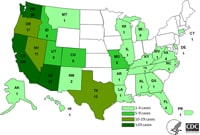
- On July 3, 2014, Foster Farms recalled an undetermined amount of chicken products that may be contaminated with a particular strain of Salmonella Heidelberg.
- The recall resulted from USDA-FSIS identifying one of the outbreak strains of Salmonella Heidelberg in an intact sample of Foster Farms brand chicken with labeling information collected from the home of a person infected with the same strain in California.
- Although the recalled chicken had production dates of March 8, 10, and 11, 2014, USDA-FSIS and CDC are concerned that the recalled chicken could still be in people’s freezers.
- Consumers should check their freezers for the recalled chicken and should not eat it.
Posted in Chicken, Government Food Alerts | No Comments »
The investigation continues into Salmonella Heidelberg infections likely related to Foster Farms chicken. As of May 22, 2014, a total of 574 persons infected with seven outbreak strains of Salmonella Heidelberg have been reported from…
Posted in Chicken, Government Food Alerts | No Comments »
- A total of nine persons infected with the outbreak strain of Salmonella Heidelberg were reported from Tennessee.
- Two (22%) of nine ill persons were hospitalized, and no deaths were reported.
- All of the ill persons were incarcerated at a single correctional facility located in Tennessee.
- This strain of Salmonella Heidelberg is commonly reported to PulseNet. Twenty-three additional persons infected with this same strain were identified from 15 other states.
- Investigations determined that these ill persons were not related to the outbreak in Tennessee.
- Sources of the infections in these 15 states were not identified.
- Epidemiologic and traceback investigations conducted by Tennessee and federal officials indicated that consumption of Tyson brand mechanically separated chicken was the source of the outbreak of Salmonella Heidelberg infections at the Tennessee correctional facility.
- On January 10, 2014, Tyson Foods, Inc. recalled approximately 33,840 pounds of mechanically separated chicken products that may be contaminated with Salmonella Heidelberg.
- Institutions that purchased recalled chicken products should not serve them.
- The recalled products were not available for consumer purchase in retail stores.
- CDC’s NARMS laboratory conducted antibiotic resistance testing on Salmonella Heidelberg isolates collected from nine ill persons in Tennessee infected with the outbreak strain and one isolate collected from leftover mechanically separated chicken product.
- Of the nine isolates collected from ill persons, two (22%) were multidrug-resistant (defined as resistant to at least one antibiotic in three or more antibiotic classes) and seven (78%) were pansusceptible (susceptible to all antibiotics tested).
- The one isolate collected from leftover mechanically separated chicken product was pansusceptible.
- It is not unusual for raw poultry from any producer to have Salmonella bacteria. CDC and USDA-FSIS recommend institutions follow food safety tips to prevent Salmonella infection from raw poultry produced by any brand.
- This outbreak of Salmonella Heidelberg infections was not related to the multistate outbreak of multidrug-resistant Salmonella Heidelberg infections linked to Foster Farms brand chicken.
Posted in Chicken, Government Food Alerts | No Comments »
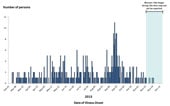
- As of December 18, 2013, a total of 416 persons infected with seven outbreak strains of Salmonella Heidelberg have been reported from 23 states and Puerto Rico.
- 39% of ill persons have been hospitalized, and no deaths have been reported.
- Most ill persons (74%) have been reported from California.
- Epidemiologic, laboratory, and traceback investigations conducted by local, state, and federal officials indicate that consumption of Foster Farms brand chicken is the likely source of this outbreak of Salmonella Heidelberg infections.
- On October 7, 2013, U.S. Department of Agriculture’s Food Safety and Inspection Service (USDA-FSIS) issued a Public Health Alert due to concerns that illness caused by Salmonella Heidelberg is associated with chicken products produced by Foster Farms at three facilities in California.
- On October 10, 2013, USDA-FSIS announced that Foster Farms submitted and implemented immediate substantive changes to their slaughter and processing to allow for continued operations.
- This investigation is ongoing. USDA-FSIS is prepared to take additional actions or expand the investigation based on new evidence.
- On October 12 and October 17, 2013, Costco’s El Camino Real store located in South San Francisco, California recalled more than 23,000 units of rotisserie chicken products due to possible Salmonella Heidelberg contamination.
- Although the “best by” dates have passed for these products, consumers may have frozen them for consumption at a later date.
- Consumers should check their homes and freezers and should not eat the recalled chicken products. Retailers and food service establishments should not serve them.
- The outbreak strains of Salmonella Heidelberg are resistant to several commonly prescribed antibiotics. This antibiotic resistance may be associated with an increased risk of hospitalization.
- It is not unusual for raw poultry from any producer to have Salmonella bacteria. CDC and USDA-FSIS recommend consumers follow food safety tips to prevent Salmonella infection from raw poultry produced by Foster Farms or any other brand.
Posted in Chicken, Government Food Alerts | No Comments »
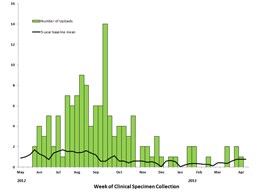
- Read the Advice to Consumers »
- A total of 134 persons infected with the outbreak strain of Salmonella Heidelberg were reported from 13 states.
- 31% of ill persons were hospitalized, and no deaths were reported.
- Most of the ill persons were reported from two states, Oregon (40) and Washington (57).
- Collaborative investigative efforts of local, state, and federal public health and regulatory agencies indicated that Foster Farms brand chicken was the most likely source of this outbreak.
- Testing conducted by the Washington State Public Health Laboratories identified the outbreak strain of Salmonella Heidelberg in four intact samples of chicken collected from three ill persons’ homes in Washington, which were traced back to two Foster Farms slaughter establishments.
- The U.S. Department of Agriculture Food Safety and Inspection Service (USDA-FSIS) completed an investigation to determine the source of infections in this outbreak.
- As part of this investigation, USDA-FSIS sent an incident investigation team to one Foster Farms slaughter establishment. The results of the investigation are being finalized.
- The current outbreak appears to be over as the number of reported infections has returned to baseline levels. However, it is not unusual for raw poultry from any producer to have Salmonella. It is important for consumers to follow food safety tips when handling raw poultry to help protect themselves and others from foodborne illness.
Posted in Chicken, Government Food Alerts | No Comments »
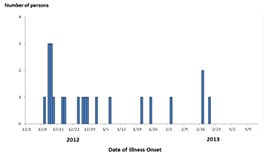
- A total of 22 persons infected with the outbreak strain of Salmonella Typhimurium were reported from 6 states.
- The number of ill persons identified in each state was as follows: Arizona (1), Illinois (2), Iowa (1), Michigan (9), Pennsylvania (1), and Wisconsin (8).
- 50% of ill persons were hospitalized, and no deaths were reported.
- Collaborative investigative efforts of state, local, and federal public health and regulatory agencies indicated that ground beef produced by Jouni Meats, Inc. and Gab Halal Foods were the likely sources of this outbreak.
- On January 24, 2013, Jouni Meats, Inc. recalled approximately 500 pounds of ground beef products.
- On January 25, 2013, Gab Halal Foods recalled approximately 550 pounds of ground beef products.
- Consumers should check their freezers for recalled products and not eat them; retailers and food service operators should not serve them.
- While the use-by date of the recalled ground beef products has passed, consumers might still have recalled ground beef in their homes if the ground beef was frozen at home.
- Consumers should not eat raw or undercooked ground beef.
- Cook ground beef hamburgers and beef mixtures such as meat loaf to 160°F internal temperature using a food thermometer.
- This particular outbreak appears to be over. However, Salmonella is an important cause of human illness in the United States. More information about Salmonella infection, and steps people can take to reduce their risk of infection, can be found on the CDC Salmonella Web Page.
Posted in Government Food Alerts, Ground beef | No Comments »
 /salmonella/live-poultry-06-17/images/big-map-7-7-17.jpg
/salmonella/live-poultry-06-17/images/big-map-7-7-17.jpg







